When it comes to exploring natural remedies for various health conditions, buttermilk often takes a backseat to more popular options. However, this humble dairy beverage holds numerous health benefits, including its potential in cancer treatment. In this article, we delve into the world of buttermilk and shed light on its promising role in supporting cancer patients.
Understanding Buttermilk
Buttermilk is a dairy product traditionally made by churning cream to extract butter. The liquid left behind after butter separation is known as buttermilk. Today, buttermilk is commonly made by fermenting milk with lactic acid bacteria, giving it a tangy flavor and a smooth consistency.
The Nutritional Composition of Buttermilk
Buttermilk is not only delicious but also a rich source of essential nutrients. It is low in fat and calories, making it a suitable option for those seeking a lighter alternative to regular milk. Buttermilk is also packed with several key nutrients, including:
Proteins: Buttermilk contains high-quality proteins, which are essential for cell repair, growth, and overall health.
Vitamins: It is a good source of vitamins such as riboflavin (vitamin B2), vitamin B12, and vitamin D, which play vital roles in maintaining optimal health and supporting the immune system.
Minerals: Buttermilk provides an array of minerals like calcium, phosphorus, potassium, and magnesium, all of which contribute to bone health and various metabolic functions in the body.
The Potential Benefits of Buttermilk in Cancer Treatment
While research on buttermilk's direct effects on cancer is limited, it does possess several properties that could potentially aid in cancer treatment and management:
Probiotic Content: Buttermilk obtained through fermentation contains beneficial bacteria, commonly known as probiotics. These probiotics help maintain a healthy balance of gut bacteria, supporting digestion, and promoting a robust immune system. A healthy gut and immune system are essential in the fight against cancer and its treatment-related side effects.
Nutrient Support: Cancer treatment often leads to nutrient deficiencies due to various factors such as decreased appetite, nausea, and altered nutrient absorption. Buttermilk, with its nutrient-dense composition, can provide vital vitamins, minerals, and proteins to help meet nutritional needs during cancer therapy.
Digestive Aid: Cancer treatments such as chemotherapy and radiation can cause gastrointestinal distress and digestive issues. The probiotics in buttermilk can help alleviate symptoms such as diarrhea, bloating, and constipation, improving overall digestive health.
Hydration and Refreshment: Staying hydrated is crucial for cancer patients, as it supports various bodily functions and helps combat treatment-related side effects like dry mouth and fatigue. Buttermilk, with its high water content and pleasant taste, can be a refreshing and hydrating beverage option.
Incorporating Buttermilk into a Cancer-Friendly Diet
If you are considering adding buttermilk to your diet during cancer treatment, here are a few suggestions:
Smoothies: Blend buttermilk with fresh fruits, such as berries or bananas, to create a nutritious and refreshing smoothie.
Salad Dressings: Use buttermilk as a base for homemade salad dressings, combining it with herbs, lemon juice, and a dash of olive oil for added flavor.
Soups and Creamy Dishes: Add buttermilk to soups or creamy dishes to enhance their taste and nutrient content. It can be a healthy substitute for heavy cream.








